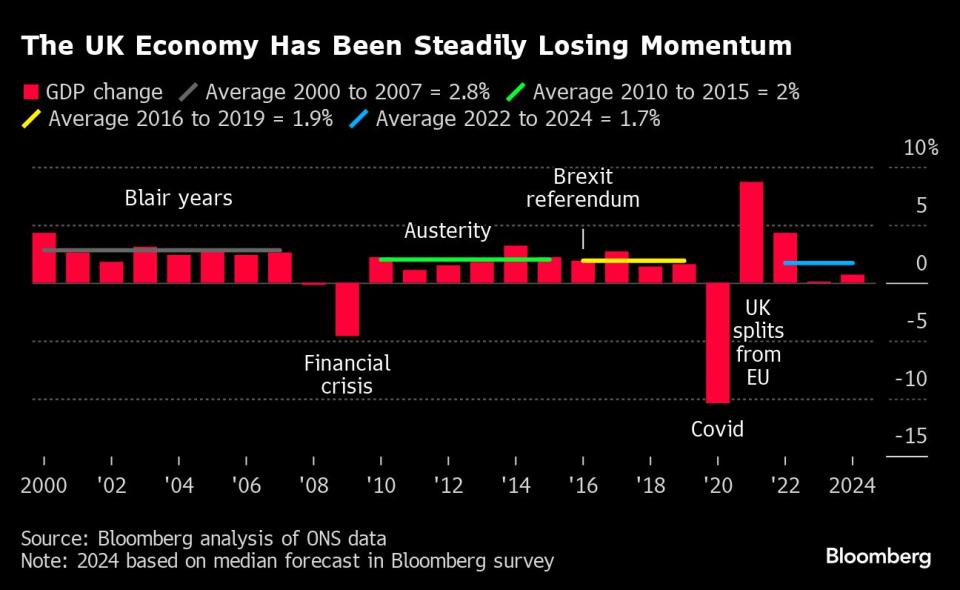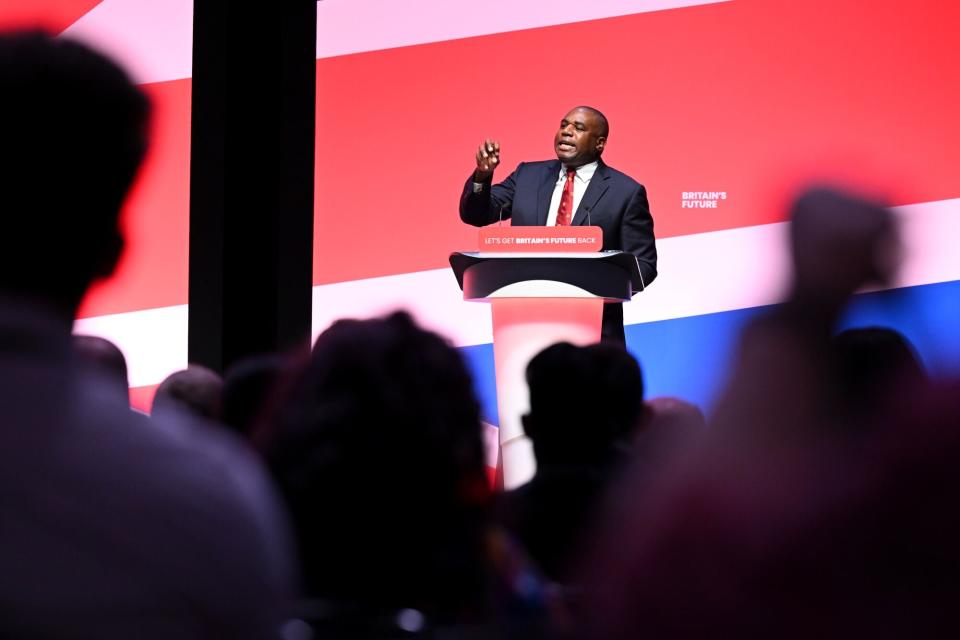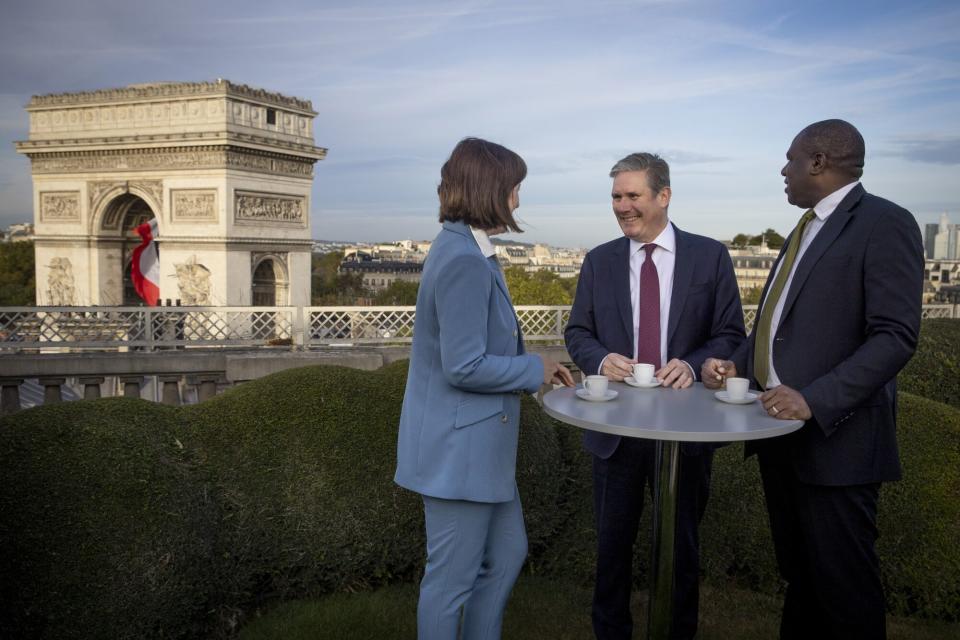Starmer’s Brexit Silence Risks Backfiring If He Gains Power
(Bloomberg) -- Keir Starmer won’t have long to wait for a chance to reset Britain’s ties with the European Union. If his Labour Party wins the UK election as expected on July 4, he’ll be welcoming dozens of fellow leaders including France’s Emmanuel Macron, Germany’s Olaf Scholz and Italy’s Giorgia Meloni for talks at Winston Churchill’s former home just two weeks later.
Most Read from Bloomberg
Nvidia’s 13% Stock Rout Has Traders Scouring Charts for Support
BuzzFeed Struggles to Sell Owner of Hit YouTube Show ‘Hot Ones’
Jain Global Raises $5.3 Billion, Secures Cash From Abu Dhabi
How Long Can High Rates Last? Bond Markets Say Maybe Forever
Wikileaks’ Julian Assange to Plead Guilty, Ending Yearslong US Battle
People close to Starmer, who polls suggest is a shoo-in to replace Rishi Sunak as prime minister, expect him to use the European Political Community summit to begin establishing a “new geopolitical partnership” with the UK’s closest and biggest trading partner. Labour wants to ease post-Brexit trade friction, boost cooperation and make it easier for Britons to work in the EU — so long as there’s no hint of reversing the 2016 vote to leave the bloc.
“We do think there’s a better deal to be had. That will have to be negotiated,” Starmer said last week.
The mood music at Blenheim Palace, where Churchill hosted a young John F. Kennedy months before World War II broke out in 1939, may be conducive to the first stage of Starmer’s plan: a new security pact. The EU offered one to Boris Johnson in the Brexit deal but was rebuffed, and Brussels remains open to it given the focus on defense as Russia’s war on Ukraine continues.
But UK officials, EU diplomats and even senior Labour figures believe Starmer will struggle to deliver a significantly different trading relationship unless he U-turns on his pledge to keep the UK out of the EU’s customs union and single market. That may disappoint voters, as well as economists and traders, who hope that a staunch Remainer as premier can in some way wind back the clock.
Those warnings underscore the paradox in Labour’s position on Europe. Along with Starmer, almost all of his top team strongly opposed leaving the bloc in 2016. David Lammy, an internationalist, friend of Barack Obama and would-be UK foreign secretary, has called Brexit a “national tragedy.” Rachel Reeves, who will be Britain’s first female Chancellor of the Exchequer if Labour wins the election, often says leaving the bloc has hurt the economy.
It would “be ridiculous to suggest” that Brexit hasn’t had a detrimental impact on the economy, Labour’s shadow business secretary Jonathan Reynolds said Monday during Bloomberg’s televised election debate. “I don’t think talking about customs unions or single markets would get us the kind of stability the UK needs,” he said, adding that Labour’s approach is “deliverable.”
Yet as Starmer tries to keep his poll-leading party on track for power, Labour aides have been instructed not to discuss Europe policy, to avoid disrupting a campaign built around the economy and Labour’s pitch for “change” after what it calls 14 years of Tory chaos, people familiar with the matter said.
Labour’s position is rooted in its historic election defeat under Jeremy Corbyn in 2019, when swathes of the party’s traditional heartlands swung in behind Johnson’s promise to “Get Brexit Done.” When Starmer took over in 2020, he calculated Labour’s route to power lay in taking the seats back.
@EllenAMilligan explains why Starmer's red lines on the EU could threaten his pledge to grow the economy https://t.co/eCVpT53Kuv pic.twitter.com/BodIUSGocN
— Bloomberg (@business) June 24, 2024
That explains his hard line on the bloc’s customs union and single market, even as Labour strategists privately concede that rejoining those — even without being an EU member — would be the most impactful way to boost the economy.
Labour’s argument is that people don’t want to relive the Brexit debates, even as polling by Redfield & Wilton for the UK in a Changing Europe think tank last month showed 74% of people who said they would vote Labour on July 4 would also vote to rejoin the EU.
“We do think that there are practical improvements that we can make to the deal that the Tories got,” Reeves told Bloomberg last week.
Labour’s wish list also includes a veterinary agreement to ease trade friction for fresh food, a touring visa for artists, and mutual recognition of professional qualifications so auditors, medics, architects and lawyers can practice in both the UK and EU.
Starmer is also eyeing smaller agreements, including on cellphone data roaming charges, and despite dismissing the idea when it was floated by the EU this year, is also open to a deal on youth mobility, people familiar with the matter said. Senior EU diplomats say these are achievable through negotiation.
Rejoining the Erasmus student exchange program is a priority, though the party is reluctant to allow EU students cheaper access to universities.
Any deals would have to fit with a pledge to reduce net migration and Labour’s promise not to return to EU rules on freedom of movement, the people said. Labour hopes to tie some of the changes to a scheduled five-year review of the UK-EU trade deal due by 2026.
On the EU’s side, a veterinary deal looks doable but would need the UK to adopt the bloc’s regulatory standards and be overseen by its European Court of Justice, EU diplomats said. Though Labour has publicly rejected so-called dynamic alignment, the commission believes there’s room for Labour to propose a bespoke formula as long as there’s a role for the ECJ.
Reynolds didn’t rule out the court’s oversight on Monday, saying he didn’t want to “give away” Labour’s negotiating hand. He also acknowledged the limits of such a deal: “There will still be costs because we’re not going to talk about going back into a customs union, so we accept that.”
But the EU is wary of tying any changes to the formal review of the trade deal, which has only been tinkered with once in relation to electric vehicles. EU diplomats say that was an exception and was also in the bloc’s interests.
“The review itself won’t be a big reset moment,” said UK in a Changing Europe researcher Jannike Wachowiak. “The things they can do are really just tinkering around the edges of the deal.”
That is likely to fall far short of repairing the market damage caused by Brexit. Purchasing euros still costs 20% than before the referendum eight years ago, while the extra compensation investors demand to hold UK assets — referred to as the “Brexit Premium” — stands at around 15%, according to analysts at Barclays Plc.
In the City, there is hope that a Labour government will become more ambitious as the UK moves toward rebuilding ties with the EU and eventually forges tighter trade links with the bloc, bolstering productivity and growth.
“But this is not something that is delivered on day one of a Starmer administration,” said BlueBay Asset Management’s Marc Dowding. “This is something you work toward over the course of the government.”
Wachowiak predicts that if Labour struggles to grow the economy in its first term, Starmer will face internal pressure to rethink Brexit red lines to secure another five-year stint in power. European officials also expect Labour to focus initially on security, defense and agri-food checks, leaving more complex issues like customs arrangements for a potential second term.
Labour officials deny the party’s red lines will change. “No, we’ve been really clear we’re not going to enter the single market, the customs union or bring back free movement of labor,” Reeves told Bloomberg.
The potential for unrest is clear. Senior Labour figures like London Mayor Sadiq Khan are further along than Starmer in demanding deeper ties with the EU, while Labour’s leader in Scotland, Anas Sarwar, has to grapple with an electorate which voted overwhelmingly to remain in the EU in 2016.
Starmer and Lammy have been working on their relationships with some of Europe’s most influential politicians. Lammy, a self-described Francophile, gave an interview to one of Macron’s favorite intellectual magazines, Le Grand Continent. “There is a great deal we can do to strengthen our cooperation as neighbors, as partners, as Europeans,” he said.
He and shadow Europe minister Stephen Doughty have built ties with the Social Democrats in Europe including Scholz and his team, and also see Poland’s Donald Tusk as a key ally.
However, Starmer hasn’t yet established a relationship with Italy’s influential leader Meloni. His team are increasingly concerned about France’s lurch to the political right, but hasn’t yet met with Marine Le Pen’s team. EU Commission President Ursula von der Leyen is unlikely to come to the EPC summit next month because it clashes with a vote on her re-appointment.
Lammy would like to create a forum similar to the EU-US Trade and Technology Council, which allows ministers to discuss how to cooperate and deepen trade and economic relations twice a year and wants the UK to attend the EU’s Foreign Affairs Council when appropriate. The EU also sees this as beneficial.
Yet while the EU is eager to deepen security cooperation, some diplomats are wary of how wide-ranging Labour expects any pact to be. Starmer’s team want it to cover economic and climate security, which the bloc worries may spill into trading arrangements that alter the Brexit agreement. The EPC summit’s agenda will be focused on Ukraine and security issues, migration and energy, people familiar with the matter said.
Other tricky issues include joint efforts to reduce growing numbers of asylum-seekers. Starmer raised the prospect of an EU returns agreement last year but is now aiming for bilateral deals with France and other countries. The EU would prefer a bloc-wide agreement, but any deal is unlikely to be reached in the first year or so of a Starmer government, people familiar with the matter said.
In the meantime, Labour will seek a UK agreement with the EU’s policing body, Europol, to boost access to shared intelligence on people-trafficking.
The EU’s new biometric data sharing system, which is expected to trigger border delays when it is rolled out in October, will be an early test of how well the UK-EU relationship is going under Labour, one senior EU diplomat said.
“People have a lot of hope when it comes to the relationship under Labour,” Wachowiak said. “But most areas are unfortunately going to be quite tricky — it’s very difficult to negotiate with the EU.”
--With assistance from Alberto Nardelli, Alex Wickham, Andrew Atkinson, Alice Atkins, Naomi Tajitsu and Thomas Hall.
(Updates with comments from Labour’s Reynolds from seventh paragraph.)
Most Read from Bloomberg Businessweek
How Jeff Yass Became One of the Most Influential Billionaires in the 2024 Election
Why BYD’s Wang Chuanfu Could Be China’s Version of Henry Ford
Independence Without Accountability: The Fed’s Great Inflation Fail
©2024 Bloomberg L.P.

 Yahoo News
Yahoo News 





